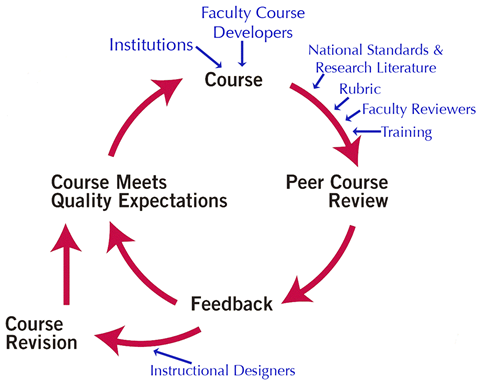
Looking for strategies to improve student success in your courses?
As educators, everything we do is deliberately intended to foster student success. This may involve strategies to increase student engagement, promote diversity, equity and inclusion, accessible course design, or learning new technologies and teaching philosophies. A strategy for holistic and continual your course
What is Course Review?
Waubonsee began developing an official course improvement process in Spring of 2021. This involved training course reviewers and developing a Waubonsee Peer review Process, which is currently under revision. When a course is up for review, instructors can choose from two course review options: Waubonsee Review (Internal) and Quality Matters Review (External).
Both Waubonsee Reviews and QM Reviews use the QM rubric except that Waubonsee Reviews acknowledge QM certification criteria (e.g. ≥85 points) as guidance for continuous course quality improvement only. Unless an instructor requests otherwise, a Waubonsee Review is the default option.
Peer Review Types
Waubonsee Review
The main purpose of an internal review is for continuous improvement. Its focus should be on individual Specific Review Standards (SRSs); based on the reviewers' comments, reviewees are encouraged to see which areas among the 42 SRSs could be improved.
Who have access to the review feedback/data?
Other than Waubonsee QM Coordinators/Review Managers, who manage the reviews, only reviewees have access to the review feedback provided by reviewers. Reviews are for reviewees' reference only; it is not available for anyone else or used for other purposes.
What happens if a course doesn't meet expectations?
Internal Reviews are for reflection and continuous improvement. While all instructors are encouraged to get their courses QM‑certified, meeting QM criteria is not a requirement for delivering online.
Quality Matters Review
Courses seeking QM certification need to meet three different criteria: Courses need to have Module Level Outcomes or Objectives (MLOs) (SRS 2.2) to quality for official QM review/certification. MLOs are a component of Alignment, which is a concept unique to the QM rubric. Courses need to have been created with well‑applied Course Level Outcomes (CLOs) (SRS 2.1). For more information about aligning outcomes, you are strongly encouraged to register for the Intro2QM workshop. Finally, courses need to meet all essentials SRSs and total at least 85 points on the rubric.
Whether a Waubonsee or QM review is chosen by an instructor, developing Module Level Outcomes is highly encouraged as they will help reveal the alignment between Course Level Outcomes with content and activities.
Comparison
| Quality Matters Review | Waubonsee Review |
|---|---|
|
This option can result in a QM certification mark if the course meets the expectations of these 3 criteria:
This option may also be chosen if you feel uncomfortable having Waubonsee colleagues review your course. MLOs are required to complete the QM review and they must match the CLOs. |
This option follows the same process as the internal reviews spanning 2017-2020, updated to use the QM rubric. It does not qualify a course for a QM certification mark. The comments provided by reviewers are housed on the QM website. The review is only for reviewee reference to consider what could be improved in the course and is not used for other purposes. After a course is reviewed internally, you can still request a QM review if you are seeking certification. |
Review Process
Quality Matters is a faculty-driven, peer review process that is:
Collaborative | Collegial | Continuous | Centered
QM offers the structure for faculty to provide peer-to-peer feedback that is useful and actionable in the continuous improvement of online courses.

The peer reviews are designed to be a formative assessment for course improvement. They are about the course quality, not about individual instructors or faculty evaluation. Unsurprisingly, many peer reviewers are Faculty Advisors from major publishers. The process is intended to be diagnostic and collegial in a supportive environment, not evaluative and judgmental.
A QM Certified course is one that meets the expectations of the shared standards. Statistically, 61% of QM-managed course reviews meet standards upon their initial review, with most meeting after minor amendments. A QM course certification is valid for five years, unless substantial changes (>20% on a component) are made after the course is certified. Recertification can extend validity for an additional three years before another review cycle takes place.
FAQs
For additional questions or for more information on Quality Matters or Course Review, please contact Jen Howard, Instructional Designer/Technologist through the Office of Faculty Development and Engagement.
